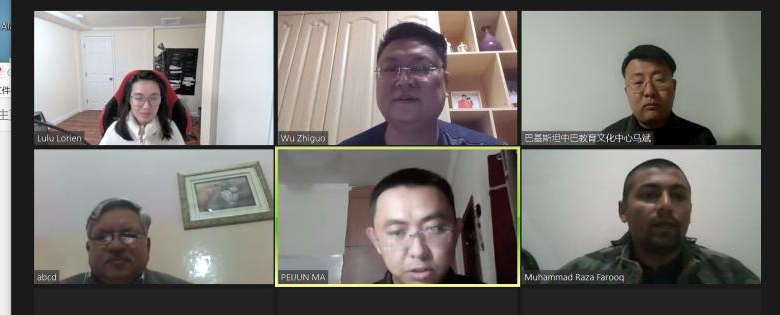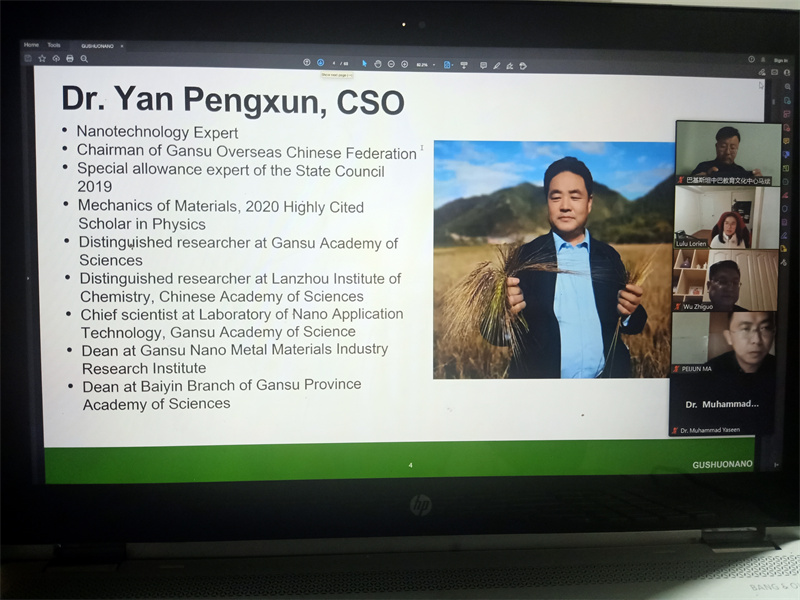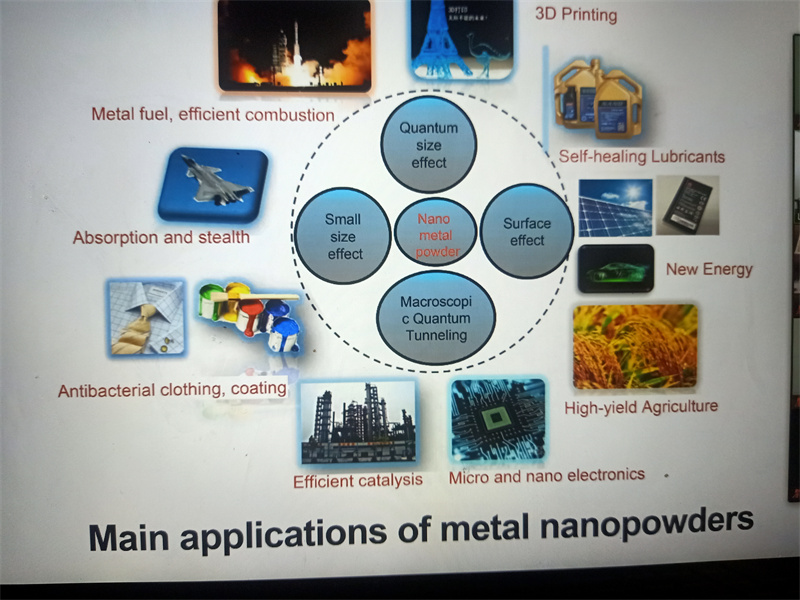纳米高效农业助推“一带一路”中巴农业合作
1月12日,甘肃纳米高效农业团队与巴基斯坦费萨拉巴德农业大学穆罕麦德.雅塞日博士,甘肃省侨联“一带一路”国际技术转移中心执行理事长马玉田,巴基斯坦企骏国际贸易公司董事长马斌、总经理马博、副总经理马培军召开了视频会议,就纳米高效农业项目合作等进行了充分交流。

此次会议由纳米高效农业团队国际推广代表Lulu Lorien主持召开,甘肃省侨联“一带一路”国际技术转移中心理事、兰州大学副教授、甘肃省科学院纳米室主任吴志国就纳米高效农业项目国际国内推广情况进行了详细的介绍。据了解:2017年,甘肃省科学院特聘研究员闫鹏勋全球首次提出将高质量单质金属纳米铁粉体用于农业,并提出了“纳米高效农业”新理念。五年来在甘肃、新疆、河南、宁夏、内蒙、四川、海南、黑龙江、吉林、湖南、河北、天津等23个省市自治区充分开展了主粮作物、水果蔬菜、牧草和中草药等55种作物上示范推广,总推广面积累计超过4200英亩(2.5万亩),种子处理加上叶面喷洒总体纳米处理增产效果普遍达到了24-42%。纳米高效农业团队与兰州大学、甘肃省农科院、甘肃农业大学、奇正藏药、中国热带农科院、湖南水稻研究所、南京农业大学、甘肃省耕保总站、甘肃省农业技术推广总站、河南省土肥站、俄罗斯远东农业科学院、印尼、马来西亚、泰国、联合国肥料协会(IFA)等国内外科研院所、高校和农业部门及企业开展了试验示范合作,取得了显著的增产增效、提升品质、抗病虫害和自然灾害、有效降低化肥和农药使用量、改良土壤等作用。

穆罕麦德.雅塞日博士对纳米高效农业项目取得的成效给予了高度的肯定,表示:目前巴基斯坦全国有44%的耕地用来种植小麦,巴基斯坦人早饭吃的“恰巴蒂”、午饭和晚饭吃的馕,都由小麦制成,小麦的生产关系到整个国家的粮食安全。但是,巴基斯坦小麦单产量不及世界平均水平,巴基斯坦的农业科学家们一直在想办法引进产量更高的小麦品种和新技术。巴基斯坦费萨拉巴德是甘肃的友好城市,纳米高效农业项目在农业上的成果可以在费萨拉巴德试验,如果成功将在巴基斯坦全国推广,以提高粮食的产量。

巴基斯坦企骏公司董事长马斌表示,“一带一路”是中国梦,也是巴基斯坦人们的梦,“一带一路”不仅对中国有利,对全世界也有利,哪个国家加入“一带一路”,都会过得更幸福。多年来,在中巴经济走廊和“一带一路”倡议引领下,中国与巴基斯坦在农业领域的研究与合作不断推进,纳米高效农业项目所取得的成果不仅将造福巴基斯坦农民,也将为中国的农业科技走向世界开辟一条新路。

Nanotechnology for high-yield agriculture promotes Pak-China cooperation
by Mariam Raheem
“Nanotechnology for high-efficacy agriculture will promote traditional agriculture on the road of high-quality connotative development. It can effectively promote farmers’ increase in production and income and solve problems such as abandoned farmland and the adverse effects caused by excessive use of pesticides and fertilizers. We tend to extend this achievement to our ‘iron brother’ Pakistan,” Dr. Wu Zhiguo, Director of Nano Application Technology Research Office of Gansu Academy of Sciences highlighted on a video meeting with Prof. Dr. Muhammad Yaseen from University of Faisalabad (UAF) on Wednesday. Mr. Ma. Yutian, Executive Director General of Gansu BRI Technology Transfer Center attended the meeting.
Dr. Wu further explained that at present, they have developed a series of nanoparticles, including iron, copper, silicon, zinc, and other series of high-quality nano-micro-fertilizer products. The proprietary nanoparticles can increase production and efficiency, improve quality, resist pests and diseases and natural disasters, effectively reduce the use of chemical fertilizers and pesticides, and improve soil conditions.
In 2017, Prof. Yan Pengxun, Distinguished Researcher at Lanzhou Institute of Chemistry, Chinese Academy of Sciences, proposed to use high-quality elemental nano-powders for agriculture and nanotechnology high-yield agriculture. In the past four years, sufficient trials, demonstrations and promotion of grain, fruits, vegetables, forage grass, and Chinese herbal medicine have been carried out in 23 provinces and municipalities in China. The total trial field has been accumulated more than 4,200 acres.
Prof. Dr. Muhammad Yaseen affirmed the results of Nanotechnology for High-yield Agriculture project and said that at present, 44% of the arable land in Pakistan is used to grow wheat, and the production of wheat is related to the food security of the whole country. However, the yield of wheat per unit in Pakistan is lower than the world average, and agricultural scientists in Pakistan have been trying to introduce higher-yielding wheat varieties and new technologies.
“Faisalabad, Pakistan, a sister city of Gansu, welcomes the results of Nanotechnology for High-yield Agriculture project to be tested in Faisalabad and we are looking forward to its success and its expansion throughout Pakistan to increase food production,” Prof. Dr. Yaseen stressed.
On the occasion, Mr. Ma Bin, Chairman of Pakistan Qijun international Trading Co., Ltd., underlined that over the years, under the guidance of the Belt and Road Initiative and China-Pakistan Economic Corridor (CPEC), research and cooperation between China and Pakistan in agriculture have been continuously promoted. The results of Nanotechnology for High-yield Agriculture project will not only benefit Pakistani farmers, but also open a new way for China’s agricultural science and technology to reach the world.
This article originally appeared on Gwadar Pro.
(Editor:Fu Bo)